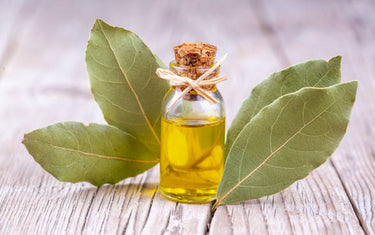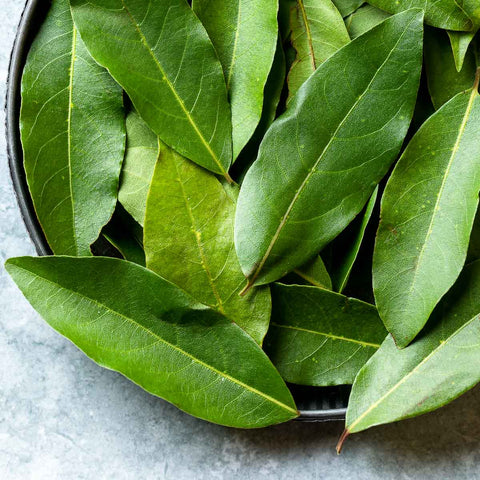8 min read / 28 March 2024 / yasmin sharp
8 Benefits and Uses of Bay Leaf Oil
Discover the transformative benefits and versatile uses of bay leaf oil, from enhancing hair health to boosting memory.

Bay leaf oil is often confused with bay laurel oil, and whilst there are similarities, there are more than enough differences that make it feel distinct.
Often used as an ingredient in modern perfumery, bay leaf has gained a noteworthy reputation for its ability to mask body odour and unpleasant smells.
Although the leaf is used around the world as a cooking ingredient, the extracted oil could be used to address a whole manner of conditions and ailments.
We unearth more about bay leaf oil benefits and how easily it can be included in your daily routine.
What is bay leaf oil?Bay leaf oil is extracted via steam distillation from the leaves of the bay tree, which is native to the Mediterranean. The leaf is most famous for its use in culinary dishes, particularly in southeast Asian and Caribbean cuisines, adding flavour to stews, meat, soups, vegetable and seafood dishes. Once extracted, bay leaf essential oil is yellow to darkish-brown in colour, with a scent that is fresh and spicy, with a distinctive medicinal edge. It has featured as an ingredient in male-centred skincare and haircare products for many years as the scent has more of a masculine appeal. |
How does bay leaf oil work?
As we explain in more detail later in the article, bay leaf oil works in different ways to support the body and mind, depending on the application method.
One of the most common uses of bay leaf oil is aromatherapy, with a few drops added to a diffuser or oil burner to allow the scent to bring calm and relaxation.
When mixed with a carrier oil, you can enjoy the benefits of bay leaf oil with a deep muscle massage to ease aches and pains or mix with a facial cleanser or moisturiser to experience its astringent qualities.
The oil can also be added to warm bath water (when diluted with a carrier oil) or used in homemade deodorant or aftershave recipes to bring out its refreshing aroma.

What are the benefits of bay leaf oil?
The main benefits of bay leaf essential oil mean it could be used to:
1. Clean and strengthen hair
Many people use bay leaf oil as part of their hair and beard care routine, as it contains several natural components that keep them healthy.
For example, the oil can act as a stimulant by boosting circulation to the scalp. This can help to boost hair thickness and growth as a growing number of studies have claimed in recent years. [1]
The oil’s antifungal properties can work to eliminate the symptoms of common scalp conditions like dandruff, by cutting off the issue at its source.
You can also use bay leaf oil as an effective pH balancing agent, which can facilitate an environment that supports better hair growth and thickness.
2. Provide anti-cancer properties
Initial studies into the properties of bay leaf extract suggest that the fruits and leaves of the plant could prove useful in the fight against breast cancer.
A study from 2013 compared one batch of cells that had been induced with bay leaf extract with another batch that had not. [2]
The cells that received the extract were killed, which suggests that bay leaf could be used as a viable natural cancer treatment, further research pending.
Another study used in vitro studies to examine the impact of using bay leaf extract against the growth of colon cancer cells. [3]
When bay leaf was added to certain foods, the results showed that its natural properties could offer some protection against early stage colorectal cancer.
3. Deodorise the refresh odours
The warm and spicy aroma of bay leaf essential oil makes it the ideal ingredient for natural aftershave or perfume recipes.
The scent is strong and long-lasting and blends well with woody and citrusy oils as well as lavender, cedarwood, ginger, rosemary, eucalyptus and ylang ylang.
Bay leaf oil benefits also include natural antifungal and antimicrobial properties that work particularly well against gram-positive bacterial strains such as E. faecium and S. aureus. [4]
Although research is ongoing, some sources suggest that bay leaves can also eliminate strains of E. coli.
If you want to try bay leaf oil instead of a regular aftershave, try mixing a few drops with a carrier oil so you can enjoy the clean, refreshing scent.
4. Reduce glucose and cholesterol levels
The benefits of bay leaf may also extend to an ability to lower glucose and cholesterol levels in people with diabetes.
A study published in 2008 found that taking capsules containing 1-3 grams of bay leaf every day had a positive effect on the participants. [5]
It is believed this is because of the presence of polyphenols, which act as powerful antioxidants.
This suggests that bay leaf could have a role to play in regulating and possibly preventing diabetes and other cardiovascular diseases.
However, if you have diabetes you should speak with your doctor before using bay leaves to treat the condition, as there is some evidence that indicates they could interfere with blood sugar control.
5. Treat and heal wounds
According to a study published in 2017, bay laurel essential oil (which comes from the Lauraceae – the same as bay leaves) proved to be effective at treating candida, a common yeast infection. [6]
When applied, the adhesion of candida to cell walls was disrupted, which made it more difficult to penetrate the membrane.
Animal studies have also shown that when the extract of bay leaf was used in a poultice to treat wounds, it demonstrated positive signs of recovery, compared to the control group that did not use the extract. [7]

6. Keep kidney stones at bay
When bay leaf was used to lower the amount of urease in the body, researchers found that, along with a handful of other traditional herbs, it may be able to prevent kidney stones.
When there is too much urease in the body, it can lead to the formation of several gastric disorders, which include kidney stones.
Whilst the initial results were promising, the researchers offered a note of caution as more research is needed to gain a better understanding of how beneficial these findings could be in treating the condition long-term.
7. Boost memory recall
There have been some early stage studies investigating the possibility that bay leaf could be used to boost memory recall.
One animal study in particular, published in 2021, saw a group of rats placed into a smoking chamber filled with bay leaf once a day for 5 minutes across a 22-day period. [11]
The results were promising, as not only did the tests seemingly improve cognitive deficits but they also helped to improve memory formation.
No human studies have been conducted in this area yet, so it remains to be seen how effective this type of treatment could be for people.
8. Ease digestive issues
You may be able to use bay leaves to improve conditions that affect the gastrointestinal system, as the natural properties could help to promote urination, which leads to the release of damaging toxins from the body. [8]
Another study from 2014 also found that stomach ulcer symptoms could be decreased by using bay leaf products. [9]
The results indicated the herb was able to combat certain bacteria that are believed to contribute to ulcers (such as Helicobacter pyloriis).
This helped to enhance the digestion process by increasing nutrient absorption, which in turn provided digestive relief.

How do you use bay leaf oil?
There are lots of bay leaf oil uses and applications you can include in your daily routine, such as using to:
Make homemade perfumes and deodorants
Bay leaf is famously used in a range of cosmetic products, particularly perfumery and deodorants.
It’s also something you can add into your daily routine quite easily, with its antimicrobial and antifungal properties working to mask unpleasant odours.
The oil’s distinctive middle mote qualities also make it perfect for blending with floral and spiced essential oils.
Take care of your skin and hair
Diluting a few drops of bay leaf essential oil with a carrier oil of choice and adding it to your hair or beard can help to grow and thicken, whilst also leaving it smelling fresh.
The oil’s astringent properties can also help to keep skin looking clean, youthful and bright, when either mixed with a carrier oil or added to your favourite moisturiser.
What is the history of bay leaf oil?
The deodorising benefits of bay leaf oil gained notoriety during the 20th and 21st centuries, with people in the West Indies using it as a key ingredient in the famous Bay Rum aftershave.
It was originally created by sailors in the region who would return back from long periods at sea in need of a refresh.
They discovered that rubbing bay leaves on themselves could help to mask the unwanted odours that came with long days and weeks spent on deck.
It’s hardly a new discovery – its cosmetic uses can be traced back at least over a century – but the timeless warmth of its scent ensures that it will never go out of style.

Bay leaf oil FAQs
What does bay leaf oil smell like?
Bay leaf essential oil has a camphorous scent with notes of light fruits and herbs, producing a spicy and smoky fragrance.
It’s a warm and inviting scent that blends well with a host of other oils, making it an aromatherapeutic staple for many people.
What are the risks of using bay leaf essential oil?
Whilst there are plenty of bay leaf oil benefits, there are one or two things to be aware of before using.
First-time users should complete a patch test to check for any irritations or reactions.
Bay leaf essential oil is not made for consumption and should only be used in aromatherapeutic or topical applications.
Is bay leaf oil good for mental health?
Bay leaf essential oil is used by lots of people to address moments of stress and anxiety, with the calming scent helping to create a relaxing atmosphere.
The oil also contains linalool, a bioactive compound that some studies have suggested can be used as a therapeutic and medicinal tool to treat depression. [10]
[1] Nicole Natarelli et al. (2023) Integrative and Mechanistic Approach to the Hair Growth Cycle and Hair Loss https://www.mdpi.com/2077-0383/12/3/893
[2] Violet Kasabri et al. (2013) Evaluation of the volatile oil composition and antiproliferative activity of Laurus nobilis L. (Lauraceae) on breast cancer cell line models https://www.researchgate.net/publication/258845244_%27%27Evaluation_of_the_volatile_oil_composition_and_antiproliferative_activity_of_Laurus_nobilis_L_Lauraceae_on_breast_cancer_cell_line_models%27%27
[3] Louise Bennett et al. (2013) Molecular size fractions of bay leaf (Laurus nobilis) exhibit differentiated regulation of colorectal cancer cell growth in vitro https://pubmed.ncbi.nlm.nih.gov/23859043/
[4] Saima Batool et al. (2019) Bay Leaf https://www.ncbi.nlm.nih.gov/pmc/articles/PMC7152419/
[5] Alam Khan et al. (2009) Bay Leaves Improve Glucose and Lipid Profile of People with Type 2 Diabetes https://www.ncbi.nlm.nih.gov/pmc/articles/PMC2613499/#:~:text=In%20summary%2C%20this%20study%20demonstrates,people%20with%20type%202%20diabetes.
[6] Larissa Rangel Peixoto et al. (2017) Antifungal activity, mode of action and anti-biofilm effects of Laurus nobilis Linnaeus essential oil against Candida spp https://pubmed.ncbi.nlm.nih.gov/27771586/
[7] Saima Batool et al. (2019) Bay Leaf https://www.ncbi.nlm.nih.gov/pmc/articles/PMC7152419/#:~:text=Animals%20treated%20with%20bay%20leaf,and%20weight%20of%20granulation%20tissue.
[8] Ester Speroni et al. (2011) Gastroprotective effect and antioxidant properties of different Laurus nobilis L. leaf extracts https://pubmed.ncbi.nlm.nih.gov/21314364/
[9] Mahmood Biglar et al. (2014) Screening of 20 Commonly Used Iranian Traditional Medicinal Plants Against Urease https://www.ncbi.nlm.nih.gov/pmc/articles/PMC3977070/#__ffn_sectitle
[10] Éverton Renan Quaresma dos Santos et al. (2022) Linalool as a Therapeutic and Medicinal Tool in Depression Treatment: A Review https://www.ncbi.nlm.nih.gov/pmc/articles/PMC9886818/
[11] Ion Brinza et al. (2021) Bay Leaf (Laurus Nobilis L.) Incense Improved Scopolamine-Induced Amnesic Rats by Restoring Cholinergic Dysfunction and Brain Antioxidant Status https://www.ncbi.nlm.nih.gov/pmc/articles/PMC7914738/










